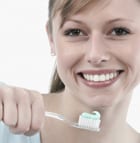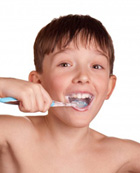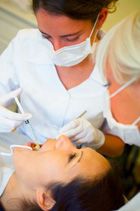 Although you may think you have nailed the art of cleaning your teeth in the city ofLeeds, you shouldn’t get to complacent about anything. As you grow older, your teeth change tact and will pose different challenges to your oral hygiene. The basics involve you finding a good toothbrush and then learning how to move it in and out of your teeth as you work it around your mouth. This brush can be hand held or electric, but it also dependent on you finding toothpaste to work with it, and a paste that is sympathetic to the subtleties of your gums and teeth. These have always been the basics of cleaning your teeth. But things have got even better over the years; dental flosses and small, inter-dental brushes have helped to get in between the teeth and gums where a normal toothbrush cannot reach. Mouthwashes have also come into the equation and are designed to do a job themselves; they can help to eliminate bacteria from the surfaces of the teeth and give extra back-up to what you do every day. The last part of this jigsaw of course is your dentist. This is the person you should always keep on your side, as they can see parts of your mouth that you can never see, and then clean deep for the complete and total back-up to what you do daily.
Although you may think you have nailed the art of cleaning your teeth in the city ofLeeds, you shouldn’t get to complacent about anything. As you grow older, your teeth change tact and will pose different challenges to your oral hygiene. The basics involve you finding a good toothbrush and then learning how to move it in and out of your teeth as you work it around your mouth. This brush can be hand held or electric, but it also dependent on you finding toothpaste to work with it, and a paste that is sympathetic to the subtleties of your gums and teeth. These have always been the basics of cleaning your teeth. But things have got even better over the years; dental flosses and small, inter-dental brushes have helped to get in between the teeth and gums where a normal toothbrush cannot reach. Mouthwashes have also come into the equation and are designed to do a job themselves; they can help to eliminate bacteria from the surfaces of the teeth and give extra back-up to what you do every day. The last part of this jigsaw of course is your dentist. This is the person you should always keep on your side, as they can see parts of your mouth that you can never see, and then clean deep for the complete and total back-up to what you do daily.









 So what is your daily routine in Leeds? Get up brush your teeth, have breakfast, go to work, snack and smoke, and go for drinks after and maybe a bite, then get home and give your teeth another brush before retiring? To be fair, there’s a good chance you’re not the only one. But somewhere in that equation, you are leaving your teeth vulnerable to the attack of plaque and it’s your eating habits. Food should always be removed from the teeth by some form of brushing or flossing after you have had something to eat to ensure that no acids are allowed to form on the teeth and eat into the enamel. It’s important that you recognize this and get into a routine of proper cleaning for the future health of your teeth. By choosing the right brush and toothpaste, you give yourself a fighting chance against the evils of plaque. Shop around and try a few out first until you get the right ones because by shelling out and getting it right at this stage, you are going to save a fortune in the future on expensive corrective treatments to your teeth. Carry a brush and some floss with you, maybe even a mouth-wash so that you can keep your mouth clean throughout the day and though it sounds crazy, learn to brush your teeth properly as well. Oral hygiene should be automatic in your life, win the battle and you’ll be smiling throughout the day, lose the battle and, well, you know the rest!
So what is your daily routine in Leeds? Get up brush your teeth, have breakfast, go to work, snack and smoke, and go for drinks after and maybe a bite, then get home and give your teeth another brush before retiring? To be fair, there’s a good chance you’re not the only one. But somewhere in that equation, you are leaving your teeth vulnerable to the attack of plaque and it’s your eating habits. Food should always be removed from the teeth by some form of brushing or flossing after you have had something to eat to ensure that no acids are allowed to form on the teeth and eat into the enamel. It’s important that you recognize this and get into a routine of proper cleaning for the future health of your teeth. By choosing the right brush and toothpaste, you give yourself a fighting chance against the evils of plaque. Shop around and try a few out first until you get the right ones because by shelling out and getting it right at this stage, you are going to save a fortune in the future on expensive corrective treatments to your teeth. Carry a brush and some floss with you, maybe even a mouth-wash so that you can keep your mouth clean throughout the day and though it sounds crazy, learn to brush your teeth properly as well. Oral hygiene should be automatic in your life, win the battle and you’ll be smiling throughout the day, lose the battle and, well, you know the rest! A relatively new weapon in the war against dental disease is the dental hygienist. More and more dental practises across the country are using hygienists to supplement the treatment offered by the dentist, to provide the most comprehensive dental care possible.
A relatively new weapon in the war against dental disease is the dental hygienist. More and more dental practises across the country are using hygienists to supplement the treatment offered by the dentist, to provide the most comprehensive dental care possible.

